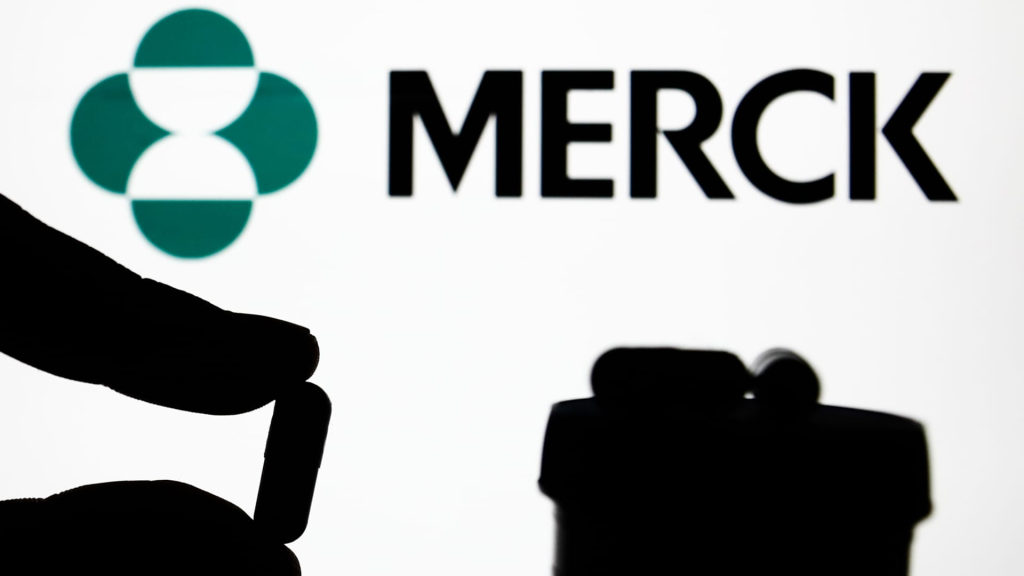On Thursday, Merck announced a downward revision to its full-year profit forecast, attributing this change to projected costs of $200 million related to tariffs and a charge linked to a recent deal.
The pharmaceutical giant now anticipates its adjusted earnings for 2025 to range between $8.82 and $8.97 per share, a slight decrease from the earlier estimate of $8.88 to $9.03 per share.
The company explained that the anticipated tariff expenses are largely a result of duties imposed between the U.S. and China, with additional impact from Canada and Mexico. With a strong foothold in China, one of its crucial markets, Merck’s operations there encompass several partnerships along with manufacturing and research facilities.
Merck emphasized that the updated forecast does not factor in the tariffs on pharmaceuticals intended for import into the U.S., announced by President Trump, which are leading many pharmaceutical companies to enhance their manufacturing capabilities within the United States.
This includes Merck’s own substantial investment of $12 billion in U.S. manufacturing and research and development, with plans to commit an additional $9 billion by the end of 2028.
During an earnings call on Thursday, Merck’s CEO Rob Davis expressed confidence in the company’s handling of short-term challenges, stating, “as you look at 2025, we’re well positioned with inventory to be able to mitigate anything we could see in the short term.” He mentioned that, looking towards the medium and long term, the company is evaluating where they can either reposition existing manufacturing or incorporate external production to “bridge gaps” and strengthen internal output.
“In many ways, we are aligned with what the administration is wanting to do, and feel that we’re in position to be able to do that quite effectively,” he added.
The new earnings guidance also includes a one-time charge of approximately 6 cents per share associated with Merck’s licensing agreement with Hengrui Pharma, a deal that was announced in March.
In its first-quarter report released the same day, Merck reported revenue and profits that surpassed analysts’ expectations, driven by strong performance in its oncology portfolio and animal health products.
The company highlighted noteworthy sales growth from two recently launched products: Winrevair, aimed at treating a severe lung condition, and Capvaxive, a vaccine designed to protect adults from pneumococcus, a bacteria that can lead to serious illnesses and lung infections. These products are expected to play an essential role in compensating for revenue losses from Keytruda, a leading cancer therapy set to lose exclusivity in 2028.
Here are the first-quarter results from Merck in comparison to analyst expectations based on a survey by LSEG:
- Earnings per share: $2.22 adjusted vs. $2.14 expected
- Revenue: $15.53 billion vs. $15.31 billion expected
The company recorded a net income of $5.08 billion, translating to $2.01 per share, an increase from the $4.76 billion, or $1.87 per share, net income from the same period last year.
When excluding acquisition and restructuring costs, Merck’s earnings stood at $2.22 per share for the first quarter, with total revenue at $15.53 billion, marking a 2% decrease compared to the previous year.
Pharmaceutical and Animal Health Sales
Merck’s pharmaceutical division, responsible for a wide array of medications, generated $13.64 billion in revenue during the first quarter, reflecting a 3% decline from the prior year.
Keytruda brought in $7.21 billion during the quarter, indicating a modest 4% increase from the previous year, fueled by rising demand for its application in earlier-stage cancers as well as strong needs for its use in metastatic cases. However, this figure fell short of analyst predictions, which had estimated sales at $7.43 billion, according to StreetAccount.
Additionally, Merck faced ongoing challenges with sales of Gardasil, a vaccine that targets HPV, the most prevalent sexually transmitted infection in the U.S., primarily due to issues in the Chinese market.
In February, Merck disclosed its decision to suspend Gardasil shipments into China starting that month, a halt expected to continue through at least mid-2025. Investors will likely seek updates regarding this situation during Thursday’s earnings call.
China represents a significant portion of Gardasil’s international sales, and Merck hopes the expanded approval for men aged 9 to 26 in China will help increase vaccine uptake.
Gardasil recorded sales of $1.33 billion, down 41% from the same quarter last year, primarily due to reduced demand in China. This figure also fell below the $1.45 billion analysts had projected, according to StreetAccount estimates.
In response to U.S. products, China has implemented tariffs as high as 125%. Analysts suggest these tariffs could potentially lead to higher prices or reduced availability of certain Western medicines for Chinese consumers, as reported by Reuters.
Merck’s animal health segment, which focuses on vaccines and medications for pets and livestock, generated sales of approximately $1.59 billion, a 5% increase compared to last year. The growth was buoyed by rising demand for livestock products and contributions from Elanco’s aqua division, which Merck acquired the previous year.


























